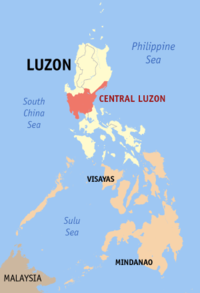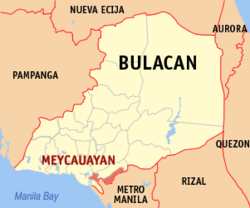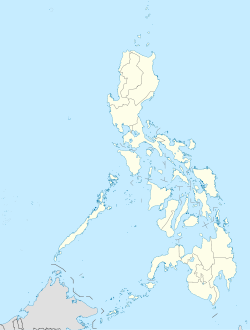- Meycauayan
-
City of Meycauayan
Lungsod ng Meycauayan— City — Map of Bulacan showing the location of Meycauayan Location in the Philippines Coordinates: 14°44′N 120°57′E / 14.733°N 120.95°ECoordinates: 14°44′N 120°57′E / 14.733°N 120.95°E Country  Philippines
PhilippinesRegion Central Luzon (Region III) Province Bulacan District 4th District Founded October 4, 1578 Cityhood December 10, 2006 Barangays 27 Government – Mayor Joan Alarilla (NPC/Partido Del Pilar) Area – City 32.10 km2 (12.4 sq mi) Population (2007) – City 196,569 – Density 6,123.6/km2 (15,860.2/sq mi) – Metro Manila Time zone PHT (UTC+8) ZIP Code 3020 Income class 1st Class; Urban [1] Website meycauayan.gov.ph Population Census of Meycauayan City Census Pop. Rate 1995 137,081 — 2000 163,037 3.79% 2007 196,569 2.61% The City of Meycauayan is a 1st Class, highly urbanized city in the province of Bulacan, Philippines. The city is located about 19 km north of Manila and about 22 km south of Malolos City, the provincial capital city. It is bounded by the town of Marilao to the north, Valenzuela City to the south, Caloocan City (North) to the east, and the town of Obando to the west. It encompasses an aggregate area of 22.1 square kilometres, representing 1.17% of the total land area of the province of Bulacan. According to the latest census, it has a population of 196,569 people in 34,882 households. In 2007, Meycauayan and neighboring district of Marilao were listed as 2 of the most polluted cities in the world.[2]
Meycauayan City is known for its jewelry and tanning industry. It is also home to several industrial parks, mostly located at Barangays Iba, Camalig and Pantoc.
Contents
Barangays
Meycauayan City is administratively subdivided into 26 urban barangays.[1]
- Bagbaguin
- Bahay Pare
- Bancal
- Banga
- Bayugo
- Caingin
- Calvario
- Camalig
- Hulo
- Iba
- Langka
- Lawa
- Libtong
- Liputan
- Longos
- Malhacan
- Pajo
- Pandayan
- Pantoc
- Perez
- Poblacion
- St. Francis Gasak
- Saluysoy
- Tugatog
- Ubihan
- Zamora
Geography
Meycauayan City is generally surrounded with plain land and gentle rolling hills. Comfortably above sea level, this terrain is an interweaving of greenery and concrete road network. The slope of the land dips towards a west to north westerly direction. River, natural lake and drainage waterways envelope and criss-cross the area.
Meycauayan a province of its name in its antiquity, Is found between 120° 58’ 20” and the 127° 30’ longitude, with a latitude of 14° 41’ up to the 15°, the majority of the land, can be seen some mountains especially to the south east extension which do not exceed to same eleven leagues to the east or west and some six to the north and south. It is bordered to the east by the province of Nueva Ecija, and the district of Morong; to the South by Manila and her bay; to the West by Manila bay and the province of Pampanga, and to the North by the Province of Pampanga.[3] Today it is bordered by the town of Marilao to the north, Valenzuela City to the south, Northern part of Caloocan City to the east, and the town of Obando to the west.
History
Meycauayan means “a place full of bamboo” in the Castilian language (Spanish). The foundation of this town is dated 1578 to 1579, in which epoch they stretched out to the apostolic work of Fray Juan de Plasencia and Fray Diego de Oropesa.[4] Both part of the 1st Franciscan mission that arrived the Philippines on the first day of July, 1577.[5] Meycauayan was formerly the head of the province, and was situated like ½ league more to the east over a small hill.[6] The Church under the patronage of N.S. P. San Francisco de Asis, was at first made of bamboo and nipa, which was ruined by the typhoon in 1588.[7] A request was made to rebuilt the church, and on November 16, 1588, Dr. Santiago de Vera, made justified by such request, instantly dispatch Secretary Gaspar de Azebo to Christoval de Asquera, Mayor of the Province of Meycauayan.[8] By the order of San Pedro Bautista, it was transferred to a place called Lagolo, by R. P. Fr. Antonio de Nombela, Minister of the town.[9]
As an early Spanish town Meycauayan was also known as Mecabayan.[10] In 1591 its status was Encomienda.[11] “La encomienda de Mecabayan”, that is of, Menor de la Rea(Captain Don Martin de la Rea) had seven hundred tributes, which are two thousand eight hundred people.[12] In the “Relación de las encomiendas existentes en Filipinas el 3 de mayo de 1591[13] Includes: Dilao, Zapa y Pandaca, Mecabayan, Taitay, Pila, Mahaihai, Lumban, Panquil, Millarrit, Minalaua, Ynguinan, Linaguan, Nabua. ... In a report of Philippine encomiendas on June 20, 1591, Meycauayan was included in the encomiendas of the province of Pampanga. “Spanish Governor Gomez Perez Dasmarinas reported to the King of Spain that La Pampanga's encomiendas were Bataan, Betis y Lubao, Macabebe, Candava, Apalit, Calumpit, Malolos, Binto, Guiguinto, Caluya (Balagtas), Bulacan and Mecabayan (Meycauayan). The encomiendas of La Pampanga at that time had eighteen thousand six hundred and eighty whole tributes.”
Lagolo proved inhospitable at the time, so the town center again transferred to what is now known as Barangay Poblacion, where the Parish Church of St. Francis of Assisi still stands.In the year 1668 the church was transferred by R. P. Nicolas Santiago to the place it now occupied.[14] It is made of simple material but strong, With 60 yard long and 12 ½ wide.
Meycauayan was then one of the largest municipalities in Bulacan. The towns of San Jose Del Monte, Bocaue, Marilao, Valenzuela, Obando, Santa Maria, Balagtas and Pandi were once part of the political jurisdiction of the town. During the Spanish colonization in the Philippines, the Spanish authorities tapped Meycauayan's adobe (volcanic tuff rocks) reserves which were used for building stone houses and fortifications in and out of town. Majority of the adobe rocks that were used in building the walls of Intramuros, Manila's "old walled city", were imported from Meycauayan.
20th and 21st century
On April 4, 1949, a large fire razed the town, destroying its market center and its centuries-old church. It took years to recover from the destruction, aided by the provincial and national governments as well as by the contributions of its own citizens.
On March 5, 2001, the municipality was declared as a component city by virtue of Republic Act 9021, but its conversion was rejected by the voting people of Meycauayan in a plebiscite.
In 2005, the newly erected City Hall was moved from Barangay Poblacion to a newer structure in Barangay Camalig. The former municipal town hall now houses the Mariano Quinto Alarilla Polytechnic College.
On December 10, 2006, by virtue of Republic Act 9356, voters in Meycauayan ratified the conversion of Meycauayan into a component city of Bulacan through another plebiscite. [1] [2] It became the province's third city, joining San Jose del Monte and Malolos.
Economy
Meycauayan City is very famous for its jewelry and leather industries. For years, Meycauayan has been the hub of jewelry in the Philippines and in Asia. The place is famous for its very affordable jewelries.
Meycauayan also prides itself with leather goods. Shoes, bags and every kind of leather goods have been traditionally manufactured here. A number of leather tanneries in the city still operate in Meycauayan, which over the years have converted the city into a hub for leather goods.
The city is one of the major economic centers in the province of Bulacan.
Industrial Compounds and Parks
Meycauayan is also home to many industrial parks and compounds.
- Meycauayan Industrial Subd. I, II, III & IV
- Meridian Industrial Compound
- Muralla Industrial Project
- First Valenzuela Industrial Compound
- Sterling Industrial Park Phase I, II, III & IV
Commercial Complex
- Puregold Meycauayan
- Aliw Complex
- Market Place Arcade
- SM Savemore Meycauayan
- Esperanza Mall
- Maristel
- IS
Feasts
Traditional Feasts Name Date Location Liputan Festival 2nd Sunday of May Barangay Liputan After a nine-day novena, the fiesta culminates with a colorful fluvial procession in honor of the "Mahal na Señor ng Isla Liputan", an image of the Crucified Christ venerated on the island of Liputan. The image, along with those of the Virgin and St. Joseph, are placed on a kasko, a makeshift bamboo bier constructed on boats and decorated with buntings. The images are then taken to the old church in the center of Meycauayan for a mass. Feast of St. Francis of Assisi October 4 Barangay Poblacion A celebration held in oldest church in Meycauayan, which commemorates the foundation of the city in 1578 by the Franciscans. Of late, it has come to be known as the "Kawayanan Festival", and includes an animal parade, street dancing and other related cultural activities. Legal Controversy
Mayoralty dispute (1995-2008)
The succession of the city's administration was put into question by a series of legal cases between two former mayors.[15] Florentino Blanco, town mayor from 1987 to 1992, ran in 1995 but was disqualified by the Supreme Court for vote buying on July 21, 1997. Blanco was replaced by Vice Mayor Eduardo Nolasco in an acting capacity, serving out the remainder of his term.
Blanco ran again in 1998 but lost to Eduardo Alarilla; Blanco attempted to file an election protest against Alarilla but the COMELEC dismissed the case. He attempted to run again in 2004 but later withdrew his candidacy. In 2007, he ran once more but lost to Eduardo Alarilla's wife, Joan Alarilla (Mr. Alarilla has then reached the 3-term limit imposed by law). The former mayor Alarilla then attempted to disqualify Blanco; the COMELEC ruled in favor of Alarilla, but the Supreme Court reversed this decision, stating that Blanco is still eligible to run for public office.
Heirs of Anacleto Nieto vs. Meycauayan, Bulacan
On December 13, 2007, the Supreme Court of the Philippines ordered Meycauayan, Bulacan to surrender peaceful possession to the Heirs of Anacleto Nieto, and vacate the 3,882 square meters lot, at Poblacion, Meycauayan, TCT No. T-24.055 (M) which it used and even constructed an extension of the public market therein. Meycauayan was also ordered to pay the reasonable value of the property and P 1,716,000.00 as reasonable compensation for the use of the property from 1966 until the filing of the complaint on December 28, 1994.[16]
References
- ^ a b Philippine Standard Geographic Code listing for Meycauayan - National Statistical Coordination Board
- ^ Inquirer.net, Meycauayan, Marilao in world’s ‘Dirty 30’-- report
- ^ R.P. Felix de Huerta, Estado de la Provincia de San Gregorio Magno. Imprenta de N. Sanchez, Binondo Manila 1865 p 70.
- ^ Huerta p. 71
- ^ Fr. Jesus Galindo OFM, Commemorative book, “400 years (1578-1978) Franciscans in the Philippines, , (San Miguel Manila. 1979) P. 13
- ^ Huerta p. 71
- ^ Huerta p. 72
- ^ El P. Fr. Juan Francisco de S. Antonio, Chronicas de la Apostolica Provincia de S. Gregorio, Papa. El Magno…. Sampaloc, Extra-muros de la Ciudad de Manila , 1741 P. 317
- ^ Huerta p. 71
- ^ Paula Kay Byers, Asian American genealogical sourcebook Gale Research, 1995 p. 84
- ^ James Alexander Robertson, The Philippine Islands, 1493-1803: explorations, Volume 55 A. H. Clark company, 1909, p. 569
- ^ Wenceslao Emilio Retana, Archivo del bibliófilo filipino: recopilación de documentos históricos, científicos, literarios y políticos, y estudios bibliográficos, Volume 4. Impr. de la viuda de M. Minuesa de los Rios, 1898 P. 51
- ^ Archivo Ibero-Americano, Franciscans, 1983
- ^ Huerta p. 72
- ^ supremecourt.gov.ph, Blanco v. Comelec and Alarilla, G.R. No. 180164, June 17, 2008
- ^ supremecourt.gov.ph, HEIRS OF ANACLETO B. NIETO vs. MUNICIPALITY OF MEYCAUAYAN, BULACAN, 3rd Div., G.R. No. 150654
External links
- Charter of the City of Meycauayan (RA 9356)
- The Blacksmith Institute - World's Worst Polluted Places
- Philippine Standard Geographic Code
- 2000 Philippine Census Information
- 2007 Philippine Census Information

Marilao, Bulacan Marilao, Bulacan North Caloocan City, Metro Manila 
Obando, Bulacan 
North Caloocan City, Metro Manila  Meycauayan City, Bulacan
Meycauayan City, Bulacan 

Valenzuela City, Metro Manila Valenzuela City, Metro Manila Valenzuela City, Metro Manila Municipalities Component cities - Malolos
- Meycauayan
- City of San Jose del Monte
 Cities of the Philippines
Cities of the PhilippinesHighly-urbanized Cities Angeles · Bacolod · Baguio · Butuan · Cagayan de Oro · Caloocan · Cebu · Davao · General Santos · Iligan · Iloilo · Lapu-Lapu · Las Piñas · Lucena · Makati · Malabon · Mandaluyong · Mandaue · Manila · Marikina · Muntinlupa · Navotas · Olongapo · Parañaque · Pasay · Pasig · Puerto Princesa · Quezon City · San Juan · Tacloban · Taguig · Zamboanga
Independent
Component CitiesComponent Cities Alaminos · Antipolo · Bago · Bais · Balanga · Batangas · Batac · Bayawan · Baybay · Bayugan · Biñan · Bislig · Bogo · Borongan · Cabadbaran · Cabanatuan · Cadiz · Calamba · Calapan · Calbayog · Candon · Canlaon · Carcar · Catbalogan · Cauayan · Cavite · Danao · Dapitan · Dasmariñas · Digos · Dipolog · Dumaguete · El Salvador · Escalante · Gapan · Gingoog · Guihulngan · Himamaylan · Iriga · Isabela · Kabankalan · Kidapawan · Koronadal · La Carlota · Lamitan · Laoag · Legazpi · Ligao · Lipa · Maasin · Malaybalay · Malolos · Marawi · Masbate · Mati · Meycauayan · Muñoz · Naga, Cebu · Oroquieta · Ozamiz · Pagadian · Palayan · Panabo · Passi · Roxas · Sagay · Samal · San Carlos, Negros Occidental · San Carlos, Pangasinan · San Fernando, La Union · San Fernando, Pampanga · San Jose · San Jose del Monte · San Pablo · Santa Rosa · Silay · Sipalay · Sorsogon · Surigao · Tabaco · Tabuk · Tacurong · Tagaytay · Tagbilaran · Tagum · Talisay, Cebu · Talisay, Negros Occidental · Tanauan · Tandag · Tangub · Tanjay · Tarlac · Tayabas · Toledo · Trece Martires · Tuguegarao · Urdaneta · Valencia · Victorias · Vigan
Regional Center 
Highly Urbanized Cities Metropolitan Areas Provinces Component Cities Balanga City • Cabanatuan City • Gapan City • City of Malolos • Meycauayan City • Munoz City • Palayan City • San Fernando, Pampanga • San Jose City • San Jose del Monte City • Tarlac CityLuzon, Republic of the PhilippinesCategories:- Bulacan
- Cities in the Philippines
- Populated places established in 1578
Wikimedia Foundation. 2010.


